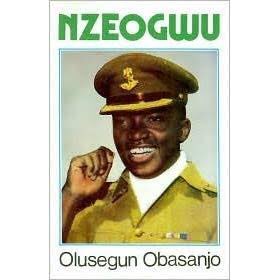I’m currently reading Obasanjo’s book on Major. “Kaduna” Nzeogwu—the leader of the Jan 15, 1966 coup and it just occurred to me how far reaching seemingly harmless attitudes can go.
Just a few quick notes before I go to bed. I’ll use two stories to buttress my point.
Just a few quick notes before I go to bed. I’ll use two stories to buttress my point.
While Nzeogwu was in secondary school in Kaduna in the early fifties, he had a reputation for being extremely disagreeable and hot headed especially if he felt that he was getting unfair treatment.
In his final year in ‘56, he rallied his classmates to protest against the school authorities for some perceived unfair treatment and they all got suspended.
Seeing as their final exams were at stake, the other students apologised to the school authorities, and got taken...
Seeing as their final exams were at stake, the other students apologised to the school authorities, and got taken...
...back in. Nzeogu, however, stuck to his principles and decided not to apologize. Hence, he had to prepare for his final exams alone at home.
Five years later in 1961, during a peacekeeping mission in Congo, Obasanjo, then a lieutenant, went for a reconnaissance mission.
Five years later in 1961, during a peacekeeping mission in Congo, Obasanjo, then a lieutenant, went for a reconnaissance mission.
On his way back, he was captured by Congolese “rebels” who harassed him, and would have killed him if their leaders hadn’t stepped in. In narrating the experience back at the Nigerian base, Obasanjo stated that he was not disarmed and that he could have shot...
All four rebels—out of which only two were armed—at different times, but he thought of his mission briefing which emphasized minimal engagement at all costs. He also thought of the political ramifications of a Nigerian soldier killing a Congolese “soldier” in that tense period...
so he decided against it. Luckily he survived unscathed. Remarking about Obasanjo’s experience, Nzeogu said, “It was a good thing it was you. I don’t have patience,” meaning that he would have killed the rebels and damned the consequences.
Examples like these litter the book.
Examples like these litter the book.
What does this tell us?
Nzeogu was a deeply principled and disciplined man. He would always do the right thing and ensured that everyone around him, even his superiors, aligned with him. He was also extremely idealistic, held strong pan-African views and was hot-headed.
Nzeogu was a deeply principled and disciplined man. He would always do the right thing and ensured that everyone around him, even his superiors, aligned with him. He was also extremely idealistic, held strong pan-African views and was hot-headed.
These traits—discipline, disagreeableness, adherence to personal principles, idealism, stubbornness—can be excellent traits when combined with a healthy dose of tact, practicality, temperance and circumspection. But he never developed those attributes.
When he found himself in a position of power, those attributes came to the fore and ruined him. The Jan 15 coup failed because it was poorly planned and rash. It seemed like the right thing to do to an idealistic Nzeogu, who would later say that he had no regrets, but looking...
...back at it, it was a very foolish line of action. His “revolution” ended up plunging the country into a three-year civil war that claimed millions of lives and devastated the economy and political system. Over 50 years later and we’re yet to recover.
One can only dream about how our fortunes would be if Nzeogu has paused to consider his actions before embarking on them.
This is one of the reasons why, more than ever, while filling public service/elective positions, competence will NEVER be enough.
This is one of the reasons why, more than ever, while filling public service/elective positions, competence will NEVER be enough.
We have to search out our impending public officers’ behavioral history and compare notes.
Beware of the hot-headed boy that can’t rein in his tongue, or the overly idealistic chap who is easily carried away by screams of “revolution”. Or the sexist. Or tribal/religious bigot.
Beware of the hot-headed boy that can’t rein in his tongue, or the overly idealistic chap who is easily carried away by screams of “revolution”. Or the sexist. Or tribal/religious bigot.
He might be competent—Nzeogu has all the marks of an excellent soldier—but his attitude might end up killing us.
Affliction shall not rise again.
(Sorry for about length, and grammatical errors. I typed as it came to me and I won’t edit.) Have a good night.
Affliction shall not rise again.
(Sorry for about length, and grammatical errors. I typed as it came to me and I won’t edit.) Have a good night.
Okay, I think this needs to be said.
I’m not blaming Nzeogwu for Nigeria’s problems. If we cast lots on blames, we’ll start somewhere around 1843. Invariably, almost everyone of us, DoA, is complicit.
I actually respect the man, but his role must not be embellished.
I’m not blaming Nzeogwu for Nigeria’s problems. If we cast lots on blames, we’ll start somewhere around 1843. Invariably, almost everyone of us, DoA, is complicit.
I actually respect the man, but his role must not be embellished.
I only used his example to show why temperament must never be sacrificed on the altar of competence, which is what some of us seem to be headed towards.
History, giving us a benefit of hindsight, should guide us to make better decisions about our future. That’s the entire point.
History, giving us a benefit of hindsight, should guide us to make better decisions about our future. That’s the entire point.

 Read on Twitter
Read on Twitter


